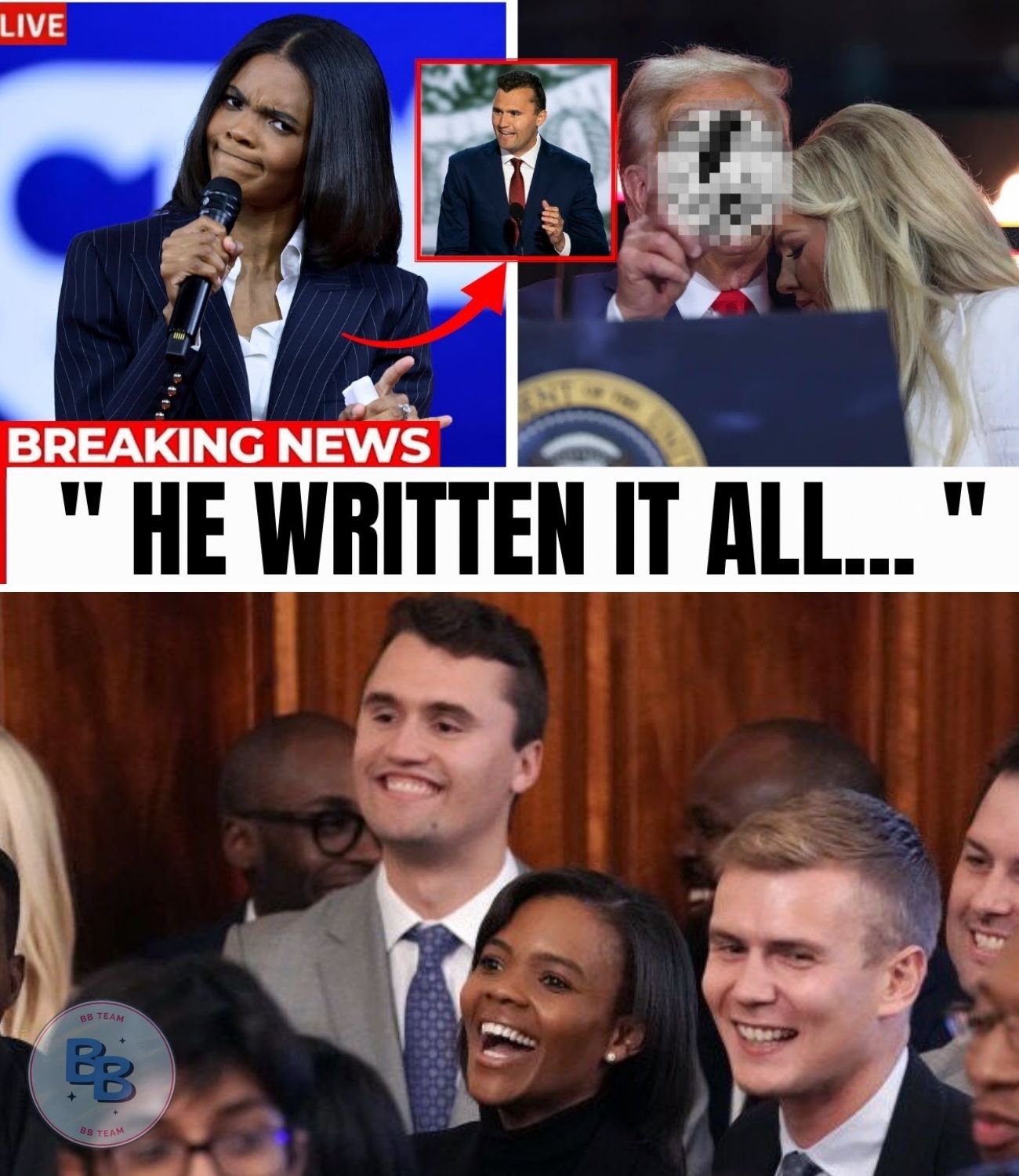
The narrative surrounding the tragic incident involving Charlie Kirk, the influential founder of Turning Point USA, was swift, neat, and official. The details were sealed, the case seemingly closed, and the public was encouraged to mourn the loss of a conservative icon. Yet, in the aftermath, a wave of dissenting voices, led by commentator Candace Owens and podcast heavyweight Joe Rogan, have ripped the veneer off the official account, suggesting that the truth of Kirk’s final days is far darker, more complex, and potentially more sinister than a random tragedy.
The emerging picture, pieced together from private journal entries, an internal financial investigation, and the shadowy appearance of a mysterious “decoy” figure, paints a portrait of a man who was not merely a victim of chance, but an individual caught in a chilling web of betrayal, manipulation, and high-stakes power dynamics. The core message resonating across social media and the journalistic sphere is simple, yet devastating: Charlie Kirk saw something, and it cost him everything.
The Diary’s Chilling Confession: A Man Unsafe in His Own Home
For years, Charlie and Erica Kirk were the picture of a stable, committed, and powerful couple—a model of commitment in the demanding world of national politics. But according to Candace Owens, who claims to have read his personal journal, the final days of the conservative firebrand were anything but peaceful.
Owens’ revelation about the diary entries on a recent live stream sent shockwaves across the political landscape. The content, she asserted, was truly thought-provoking, detailing a deep, palpable sense of fear that Kirk no longer felt safe within his own walls. The entries spoke of feeling watched, of important conversations taking place without him, and a growing suspicion that someone incredibly close was harboring a dangerous secret.
The most emotionally engaging and devastating line that Owens read aloud was a man wrestling with the ultimate betrayal: “I still love her, but I don’t know if she’ll be there for me,” This single sentence, raw and laced with profound internal conflict, instantly transformed the public’s perception of Kirk. The image of the confident, in-control national figure was abruptly replaced by the haunting vision of a man lonely, insecure, and wrestling with unspeakable doubts in his most private moments.
Owens suggested that these were not the notes of an angry man, but a man confused, trying desperately to hold onto faith in the face of deep, persistent unease. The knowledge that these lines were allegedly written just days before the incident adds a tragic layer of premonition, flipping the story from a random, private tragedy into an unfolding national mystery, driven by a potential crisis of trust. The question became immediate and inescapable: what did he see in the one person he was supposed to trust implicitly that led him to such a chilling written confession?
The Money Trail: An Audit, a Warning, and a Dangerous Discovery
The theory of a personal crisis has since intertwined with an even larger, potentially explosive institutional motive: finance and power. Just prior to the incident, Charlie Kirk had reportedly signed an internal memo regarding a large-scale financial transparency audit within the organization he founded and led, Turning Point USA.
According to Owens, Kirk was pushing for a comprehensive review of the organization’s spending, a campaign that required a thorough review to see exactly where money was being spent and where it was going. The memo, which she described as a “landmark,” included a few names that were reportedly very uncomfortable with the scrutiny—individuals with significant influence within the executive branch.
The timing of this financial push is ironic, and perhaps, deeply suspicious. Kirk signed the document just days before the incident. Those close to him noted a marked shift in his behavior: he grew wary, checked his private emails constantly, and contemplated things in silence. It was during this period that another chilling diary entry was allegedly recorded: “Some people are not going to like what I’m about to find.”
If true, this line is not merely a sign of paranoia; it is a declaration of impending discovery. It suggests that Charlie Kirk may have stumbled upon something significant, a financial irregularity or a hidden stream of funds that someone powerful desperately wanted to keep out of the public eye. The subsequent events, therefore, could no longer be dismissed as coincidence, but rather the result of a premeditated chain reaction triggered by a man who valued truth over profit. The audit was cut short by the incident, leaving an enormous, unanswered question hanging over the organization: what secrets did Charlie Kirk get close to uncovering?
The Decoy and the Orchestrated Chaos: Rogan’s Warning
Adding another complex, highly suspicious layer to the unfolding drama is the testimony of Joe Rogan, who was one of the first high-profile voices to publicly cast doubt on the official narrative. On his podcast, Rogan succinctly stated that the official story “doesn’t really add up,” pointing out technical details and the sheer speed with which the entire affair was resolved. For Rogan, the case felt like a “movie script that was rewritten midway through.”
Crucially, Rogan drew attention to a figure he called a “decoy”—an older man who mysteriously appeared at the scene, linked by many observers to other high-profile national tragedies, from the 2001 disaster to the Boston bombings. This mysterious individual reportedly caused a scene of chaos just moments after the incident, yelling and drawing the crowd’s attention, an act that witnesses believe intentionally distracted the entire scene.
The man was arrested days later on a completely unrelated charge, only to seemingly disappear entirely from the official investigation and public eye. The silence surrounding his fate is deafening and deeply suspicious.
What connects this decoy to the other threads of the mystery? Candace Owens claimed that Kirk’s diary had mentioned a man who was “set up to mislead,” suggesting he had sensed a manipulation of the events unfolding around him. The appearance, subsequent chaotic distraction, and ultimate disappearance of this figure strongly suggest an orchestrated attempt to control the flow of information and confuse witnesses—a classic tactic in larger schemes that aim to conceal a greater truth. Rogan’s skepticism was validated: the pattern of a larger, invisible hand at work was no longer a coincidence, but a terrifying script.
The Widow’s Sudden Rise: A Tribute or a Planned Replacement?

Amidst the swirling allegations, the spotlight has inevitably turned to Erica Kirk, Charlie’s widow. Previously viewed as a pillar of loyalty, her image became rapidly blurred as the details of the diary and the audit emerged. The first thing that raised serious alarm was the speed of her ascent. In a matter of days following the tragedy, Erica assumed a high-profile leadership role at Turning Point USA, being referred to in the media as her late husband’s “spiritual successor.”
For some, it was a touching display of strength, a wife turning grief into motivation to protect her husband’s legacy. For others, the rapid, almost seamless transition raised the question of whether this was a tribute or, as some speculate, a meticulously planned replacement.
Candace Owens pointed out that the timing of Charlie’s diary worries—his concern that important decisions were being made without him—coincided eerily with meetings that insiders said Erica had attended alone. Several close colleagues noted that the couple hadn’t been seen together in weeks before the incident, an absence that was initially dismissed but now appears to signal a distance that had been steadily growing.
Owens, never one to shy away from uncomfortable truths, offered a sentence that encapsulates the fear of betrayal: “Sometimes the people closest to you are not standing by your side. They are standing behind you,” a powerful warning that suggests a gap in trust where even the closest companion can become an unpredictable element.
In an atmosphere of deep suspicion, Erica Kirk’s composure, her carefully worded speeches, and the apparent readiness with which she assumed a massive role have all been re-examined. Was her calmness the product of emotional control, or a reflection of a woman who was already prepared for the role she suddenly inherited?
The Unfinished Puzzle: What Did Charlie Kirk Know?
The story of Charlie Kirk has transcended mere tragedy; it is now an intricate, unfinished puzzle. The pieces, when assembled, paint a cold, confusing, and potentially calculated picture: a man fearing his own wife, a major financial audit about to expose powerful figures, a mysterious decoy figure orchestrating chaos at the scene, and a widow who swiftly consolidates power in the vacuum left by his sudden absence.
The collective question that remains is not what happened, but why did it happen this way, and more importantly: What truth did Charlie Kirk realize he was about to find that someone was willing to execute such an elaborate plan to silence?
Candace Owens insists she is not trying to be controversial, but merely doing what Kirk would have wanted: bringing the truth to light. And with the public now scouring every blank space, every deleted file, and every hasty decision, the momentum of the mystery cannot be stopped. Charlie Kirk’s final thoughts, captured in his diary, are no longer private notes; they are the breadcrumbs leading to a larger truth about power, trust, and the deadly cost of confronting the secrets hidden in the spotlight.

